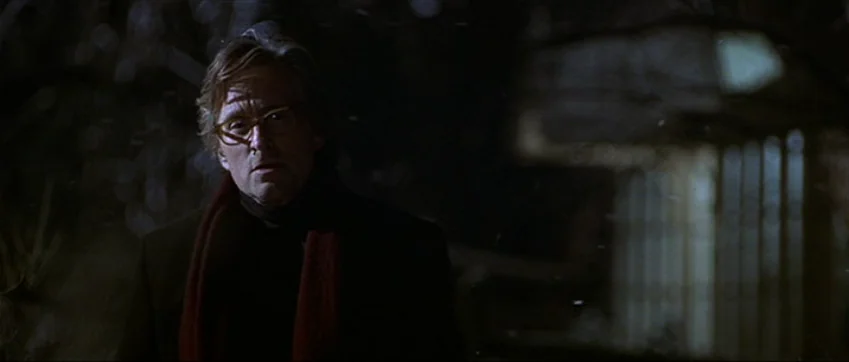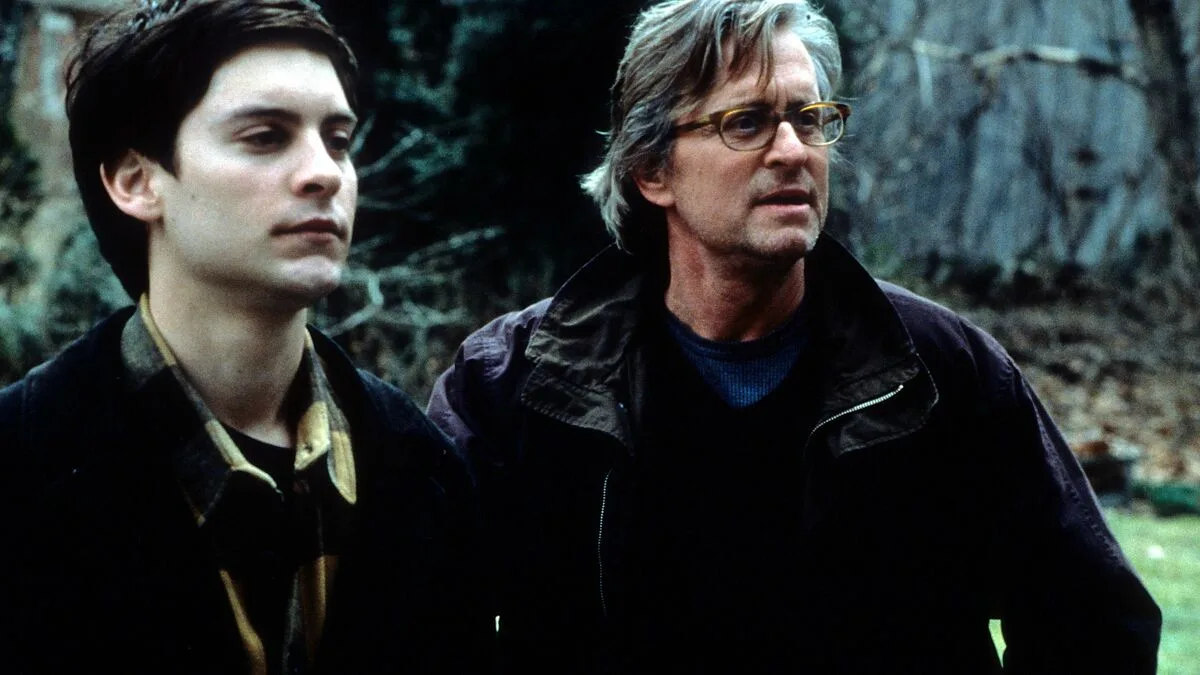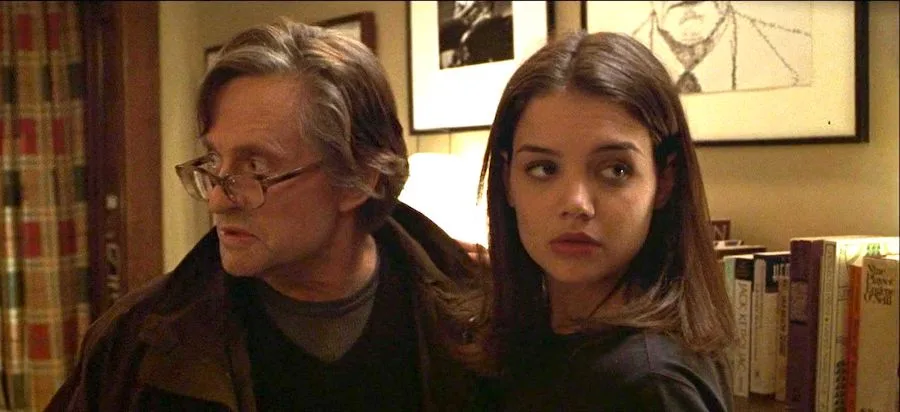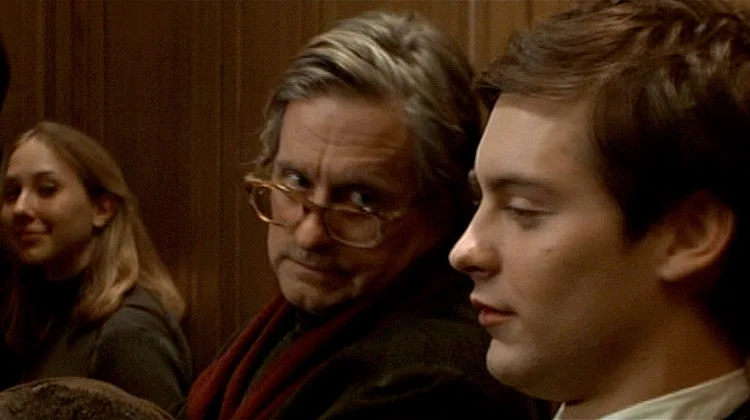“Wonder Boys,” which turns 25 this year, has been accused of bone-deep pessimism, but I’ve never remembered it in this way. Even though the story is about disillusionment and regret, and the fear of uncertainty looms like a shadow over its characters, my memory holds it as a funny and uplifting tale about dysfunctional people, some of whom just happen to be writers. Curtis Hanson’s drama has a way of distracting its audience by hiding its darker nature in plain sight. It achieves this partly through what Roger Ebert described as “an unsprung screwball comedy” but also by making itself more about the uplifting destination than the journey itself—a gentler yarn about writers, or people, rather than something grittier.
Based on Michael Chabon’s 1995 novel of the same name, it has been years since the publication of Arsonist’s Daughter, the book that put both Grady Tripp (Michael Douglas) and his editor Terry Crabtree (Robert Downey Jr.) on the map. Grady is writing his second novel, but the ending keeps getting further away. Now, his wife, Emily, has left him, and Sara Gaskell (Frances McDormand), the university’s Chancellor, with whom he has been having an affair, tells him she’s pregnant. Meanwhile, Grady has a junior literature major named James Leer (Tobey Maguire) as a house guest and is driving around with a dead dog in the trunk of his car. And Crabtree has flown in from New York for the University’s annual WordFest literary festival. He also wants to read Grady’s new novel, hoping it will salvage his floundering career.
The film begins with Bob Dylan’s aged and raspy voice singing “Things Have Changed,” a song he wrote specifically for the film. It’s a song about an inescapable self-awareness of one’s fate and feelings of disillusionment. Dylan returns time and again to the line, “I used to care, but things have changed.” It’s a pessimistic punctuation mark on the song’s thematic mood.
Then Grady’s gravelly voice reads James’ beautiful but somber short story, about a young girl sitting in a confessional. Grady is an occasional narrator, and here, in his opening narration, you can hear how weary and distracted he is—someone who is going through the motions of writing and teaching and living. During the advanced writer’s workshop, he describes James as the “sole inhabitant of his own gloomy gulag,” whose “stories were about as sunny as his disposition.”
From Dylan’s bleak poetry, including an image of the song’s narrator standing on the gallows with his head in a noose, to Grady’s pithy description wrenched from deep in his disillusioned and weary soul, the negativity only escalates. Grady sarcastically prompts the savage instincts of James’ envious classmates, who pounce like predators, ripping into him with razor-sharp words as a substitute for the teeth or claws of a wild animal. One targets the Catholic guilt and repression in his story. “I mean, Jesus! What is it with you Catholics?” Another says, “I hated it. His stories make me want to kill myself.”

In the end, it’s a matter of perspective, and while the opening scene in the classroom has a humorous slant, it doesn’t negate the vicious criticism directed at James. The scene’s dark humor depicts how vulnerability can be preyed upon, but then, the “insightful and kind” Hannah Green (Katie Holmes) suggests the class is missing the point. “He [the author] respects us enough to forget us, and that takes courage.” The scene quickly ends, and we hear the first notes of Christopher Young’s score, a chirpy melody that reintroduces “Wonder Boys” as a light, uplifting, and humorous story. This is an early example of how “Wonder Boys” not only distracts us from its darker nature but also playfully orchestrates a tension between optimism and pessimism.
This tension is apparent in “Things Have Changed” before it comes to fruition in the characters’ interpersonal relationships. The protagonist in Dylan’s song is a pessimistic soul with a long list of gripes. Besides having his head in a noose, he talks about being in the wrong town and “walking forty miles of bad road.” He talks about how he’s holding a losing hand; the mind can only take so much, and how he’s in love with a woman he’s not even attracted to. And yet, the energetic and upbeat melody, which sounds and feels optimistic, lends itself to irony, given the despondent, poetic lyrics. “Things Have Changed” is simultaneously optimistic and pessimistic, making it the perfect choice for the titles and credits, which lead to the film’s pessimistic opening and ultimately put a full stop to its happy conclusion.

Meanwhile, Neil Young’s 1972 song “Old Man” is the perfect complement to Grady and James’ relationship. The lyric “Old man look at my life, I’m a lot like you were” is a subtle way that “Wonder Boys” acknowledges that James is a younger version of Grady, who once stood with the world at his feet. A few broken marriages later, and now a stoner who can’t escape dysfunction, he, like Crabtree, has become mired in struggle and stranded without any idea what his second book is about. These opposing stations in life frame the trio as either symbols of optimism or pessimism. But this is an oversimplification, because neither Grady nor Crabtree has given up on hope—continuing to write is a hopeful act, as is planning to publish your friend’s new manuscript. And James’ tales are deeply pessimistic, as seen in the one he tells Grady about his mother, who worked as a fry cook in the cafeteria of a mannequin factory. Before that, she’d been a dancer—”Whatever kind they wanted her to be.” Nearly tripped up by Grady, who remembers she was Catholic, James trusts in his pessimism and says, “When we fall, we fall hard.” He’s not much kinder towards his father, who smokes cannabis, not for glaucoma as Grady assumes, but instead for his colon cancer.
“Wonder Boys” chooses to be a lighter, funny, and uplifting story, where problems are resolved, a wonder boy takes his first big step out into the world, an editor salvages his career, and Grady loses almost everything but ends up richer for it. Despite the transformative power at its heart, there are remnants of an unexplored but tantalizing narrative. But to see this, we must not allow ourselves to be distracted by the laughter. Instead, we must pay attention to another side of its humanity, and we should ask, what will James’ fate be? After all, he goes to New York with Crabtree to rework his novel, “The Love Parade.” But he’s being steered by someone who is described by the transvestite they picked up on a flight from New York, as someone who is “into collecting weird tricks.” So, is James a weird trick, someone for Crabtree to play with until he loses interest? Is James destined to be a promising but tragic artist, whose personal life is as dramatic, if not more, than his writing?

The roots of this inherent tension between optimism and pessimism may lie in the adaptation of Chabon’s novel. “Wonder Boys” sanitizes and romanticizes its oppressive source material, sinking you into the grime of its characters’ dysfunctional lives. Chabon’s take on Grady is far rougher around the edges. One notable example is how the book’s sexual content is more graphic, with Grady describing how he touches his girlfriend’s pussy and even expresses sympathy for James, who has a small penis. The film has sexual content, but it’s gentler and often inferred rather than shown or spoken about in detail.
This comparison offers an invaluable insight because Chabon’s novel is comfortable with the characters’ dysfunctional lives in a way that the film never is. Director Curtis Hanson and screenwriter Steve Kloves adapt the novel through a sanitized and romanticized filter. It frames “Wonder Boys” (the film) as naïve and dreamlike, seeking to comfort itself in an uncertain world where dysfunction is an inherent part of the human condition. However, the grittier reality that is repressed still finds a way to creep through and emphasizes the tension between optimism and pessimism that runs throughout the film. And just as Hannah reminds Grady that writers make choices, so Hanson and Kloves make theirs.











